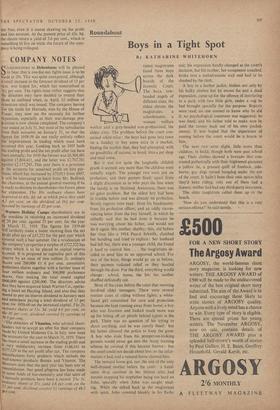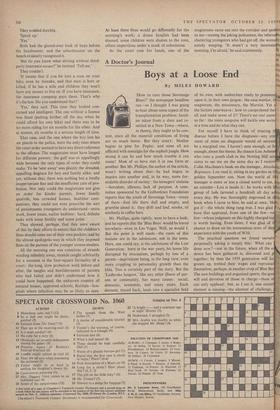Roundabout
Boys in a Tight Spot
By KATHARINE WHITEHORN THREE magistrates faced three boys across the dark boards of the Juvenile Court. The boys, tow- headed angels of different sizes, the eldest eleven; the
magistrates, a schoolmaster, a woman welfare worker and a grey-headed non-professional, the eldest sixty. The problem before the court con- cerned white mice: the boys had gone into, town on a Sunday to buy some mice in a market; finding the market shut, they had attempted, with no possibility of success, to break into a pet shop and steal some.
But it was not quite the laughable childish prank it seemed, any more than the children were actually angels. The younger two were put on probation, and their parents fined; apart from a slight discussion as to who pays the fine when the family is on National Assistance, there was no great problem. But the eldest boy had been in trouble before and was already on probation. Slowly reports were read: from his headmaster; from his probation officer; and an oddly uncon- vincing letter from the boy himself, in .which he stiltedly said that he had done it because he was worrying about his father, and would not do it again. His mother, shabby, thin, old before her time like a 1914 Punch fishwife, clutched her handbag and tried to explain: her husband had Ieft her, there was a younger child, she found it hard to control him . . . the magistrates de- cided to send him to an approved school. For two of the boys, things would go on as before; their parents radiated relief as they bustled through the door. For the third, everything would change : school, home, the lot; his mother shuffled defeatedly out.
Most of the cases before the court that morning involved older teenagers. There were several routine cases of riding without lights; a white- faced girl committed for care and protection because she kept running away from home; a boy who was fourteen and looked much more was up for letting off air pistols behind typists in the park. There was no question of his trying to shoot anything, and he was merely fined : but his father allowed the police to keep the guns. A boy who stole from his prosperous-looking parents would never get into the Army training scheme he coveted if this became known : but the court could not decide about him on the infor- mation it had, and a remand home claimed him.
The remand home got, too, the son of the only well-dressed mother before the court : a hand- some shop assistant in her thirties who ho had trouble stopping his stepfather being too hard on John, specially when John was caught steal- ing. While she talked back to the magistrates with spirit, John cowered bleakly in his flashy
suit; his expression hardly changed at the coma decision, but his mother, her composure smashed, broke into a melodramatic wail and had to' be shushed by the clerk.
A boy in a leather jacket, hidden not only by his bulky clothes but by excess fat and a dead expression, came up for the offence of interfering in a park with two little girls, under a rug he had brought specially for the purpose. Reports were read; no one seemed to know why he did it; no psychological treatment was suggested; he was fined, and his father told to make sure he paid the money back out of his own pocket- money. It was hoped that the experience of coming before the court would be a lesson to him.
The next two were slight, little more than children, in build, though both were past schoci age. Their clothes showed a bravado that con- trasted pathetically with their frightened glances;; a yellow tie, a greased quiff Of forelock, side- burns; gay dogs turned hangdog under the eye of the court. It hadn't been their own motor-bike they'd been riding; only one of them had a licence; neither had had any third-party insurance.
The elder magistrate called them up to the bench.
`Now do you understand that this is a very serious offence?' he said sternly. They nodded dumbly.
`Speak up.'
`Yes.'
Both had the glazed-over look of boys before the headmaster, and the schoolmaster on the bench evidently recognised it.
'But do you know what driving without third- party insurance means?' he insisted. 'Tell me.'
They couldn't.
'It means that if you- hit into a man on your bike, even by mistake, and that man is hurt or killed, if he has a wife and children they won't have any money to live on. If you have insurance, the insurance company pays them. That's why it's the law. Do you understand that?'
'Yes,' they said. This time they looked con- cerned and intelligent. The one without a licence was fined (putting farther off the day when he could afford his own bike) and there was to be no more riding for six months for the other. And at sixteen, six months is a serious length of time.
That case, and the one where the boy lost his air pistols to the police, were the only ones where the court order seemed to have any direct reference to the offence. The magistrates must have longed for different powers: the gulf was so appallingly wide between the only types of order they could make. To be 'sent away' was plainly the dreaded, appalling disgrace for boy and family alike; and yet, without that, there was nothing but a totally inappropriate fine and the insufficient care of pro- bation. Not Only could the magistrates not give an order for kinder parents, fewer family quarrels, less crowded houses, healthier com- panions; they could not even prescribe the sort of punishments youngsters do understand—extra work, fewer treats, earlier bedtime : hard, definite tasks with some finality and some point.
They showed, perhaps, that they were aware of this by their efforts to ensure that the children's fines should come out of their own pockets; and by the almost apologetic way in which they imposed fines on the parents of the younger mouse-stealers.
All the morning one was conscious of strands winding infinitely away, strands caught arbitrarily for a moment in the four-square formality of a court : the long, slow probation work before and after, the tangles and bewilderments of parents who had failed and didn't understand how it could have happened; the unknown country of remand homes, approved schools, Borstals—hos- pitals where infection may be as likely as cure. At least three lives would go differently for the morning's work; a dozen families had been shamed, some children were shaken to the core, others impervious under a mask of submission.
As the court rose for lunch, one of the magistrates came out into the corridor and spokxa to me—among the joking policemen, the relievet0e chattering youngsters who had got off, the worn noisily weeping. 'It wasn't a very interesti morning, I'm afraid,' he said courteously.
W k st d







































 Previous page
Previous page